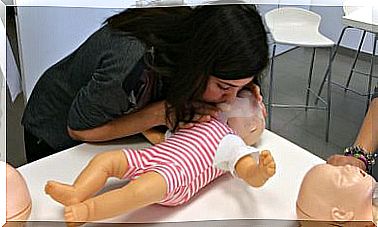The Empty Nest Syndrome And How Parents Can Deal With It

Empty nest syndrome refers to a sense of loss and emptiness that some parents experience when their children move out of the home. In this article, we’ll show you the best way to deal with this situation.
What is Empty Nest Syndrome?
Parents can feel this way as their children grow and eventually move out of the home. It’s a state of mind that brings sadness and emptiness and can sometimes even lead to depression. Mothers are more likely to have this syndrome than fathers, although it has not yet been defined as a clinical disorder.
Psychotherapist and social worker Amy Morin explains that parents with the syndrome can experience a deep emptiness in their lives. You can feel a little lost. In addition, the syndrome can also affect children’s lives and their independence and self-determination.

Symptoms and causes
According to the American Psychiatric Association (APA), one of the most common causes of empty nest syndrome is a conflicted parent-child relationship. Therefore, when parents and children have a bad relationship, this syndrome can have even worse consequences.
According to the APA, symptoms of Empty Nest Syndrome include :
- sadness
- loss
- depression
- anxiety
- lonliness
- Feeling of emptiness
5 ways to deal with empty nest syndrome
1. Keep in touch with the children
In today’s globalized world, families can stay in touch anywhere. Nowadays it is easier than ever to keep in touch with loved ones through the different apps available.
2. Set up a daily routine
Everyone has their own life. If your child wants to move out, you can still create a schedule to keep in touch. Respect each other’s time and decide together when you will see each other or talk on the phone.
3. Motivate yourself and look for new challenges
Being a father or mother is one of the most difficult tasks in life. When you want to feel fulfilled again, keep an eye out for new challenges and adventures. For example, go back to school, learn to play a new instrument, do volunteer work, etc.

4. Do yourself to prevent empty nest syndrome
Children are a big part of our life. Because they determine the lifestyle and everyday life of their parents. However, once adult children leave the family, their parents can feel lonely.
Find out what you lack, what you need, and then move on to new things. Get busy, hit the gym, become part of your community, or try to keep in touch with your friends.
5. Spend time with your partner
Parents have another chance to revive their relationship. Once the adult children move out, parents can use this free time to spend more time together. For example, enjoy life as a couple and plan appointments or trips – something just for the two of you.

Redefine your role
Don’t forget that even as your children become more independent, you are still a father or mother. Now make sure you are there when your children need you. Let your kids know that their parents are always there for them.









